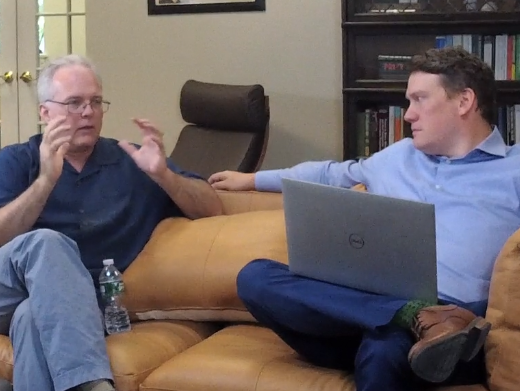Rusty Guinn
Co-Founder and CEO
Rusty Guinn is co-Founder and CEO of Second Foundation Partners, LLC, and has been a contributing author to Epsilon Theory since 2017.
Before Ben and Rusty established Second Foundation, Rusty served in a variety of investment roles in several organizations. He managed and operated a $10+ billion investment business, led investment strategy for the second largest wealth management franchise in Houston, and sat on the management committee of the 6th largest public pension fund in the United States.
Most recently, Rusty was Executive Vice President over the retail and institutional asset management businesses at Salient Partners in Houston, Texas. There he oversaw the 5-year restructuring and transition of Salient’s $10 billion money management business from legacy fund-of-funds products to a dedicated real assets franchise.
He previously served as Director of Strategic Partnerships and Opportunistic Investments at the Teacher Retirement System of Texas, a $12 billion portfolio spanning public and private investments. Rusty also served as a portfolio manager for TRS’s externally managed global macro hedge fund and long-only equity portfolios. He led diligence, process development and the allocation of billions of dollars across a wide range of indirect and principal investments.
Rusty’s career also includes roles with de Guardiola Advisors, an investment bank serving the asset management industry, and Asset Management Finance, a specialized private equity investor in asset management companies.
He is a graduate of the Wharton School, and lives on a farm in Fairfield, Connecticut with wife Pam and sons Winston and Harry. He serves as a member of the Board of Directors of the Houston Youth Symphony, and with Pam has been a long-time supporter and founding Friend of the Houston Shakespeare Festival. He also serves as a member of the Easton Volunteer Fire Company in Easton, Connecticut. Rusty spends his free time smoking meat, working his apple orchard, enjoying whisky, badly butchering progressive rock drumming and jeopardizing long-term relationships through high-stakes board games.
Articles by Rusty:
Some things are only palatable when they have been transformed into a cartoonish version of themselves. For financial professionals that raises a moral question: how much emphasis on the Cartoon of expertise about us is too much?
We get a lot of email and responses, but we REALLY got a lot about our comments on a curriculum that could replace the signaling-minded post-secondary degree industry. We publish them here.
The first debates have come and gone, and winners and losers identified. Yet in narrative world, we see a slightly different story. We learn about it in the June 30th edition of Epsilon Theory’s Election Index.
It’s the July 9th Office Hours, where we dive into all things Libra, Facebook and get an update on market narratives.
A few months ago, we noted how important it had become for public figures and corporations to control their own cartoon, lest someone control it for them. Well, now that advice has itself become the narrative. Don’t say you weren’t warned.
Access the Powerpoint slides of this month’s ET Pro monitors here. Access the PDF version of the ET Pro monitor slides here. Access the underlying Excel data here.…
Access the Powerpoint slides of this month’s ET Pro monitors here. Access the PDF version of the ET Pro monitor slides here. Access the underlying Excel data here.…
Access the Powerpoint slides of this month’s ET Pro monitors here. Access the PDF version of the ET Pro monitor slides here. Access the underlying Excel data here.…
Access the Powerpoint slides of this month’s ET Pro monitors here. Access the PDF version of the ET Pro monitor slides here. Access the underlying Excel data here.…
It’s the Pack Gathering, a small conclave of like-minded people interested in talking ideas and enjoying good, genuine company.
The first event will take place in our headquarters town of Fairfield, Connecticut. New England and Mid-Atlantic, this is your event.







